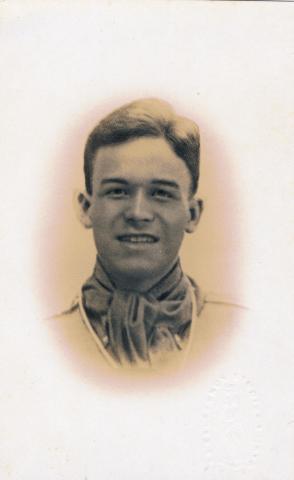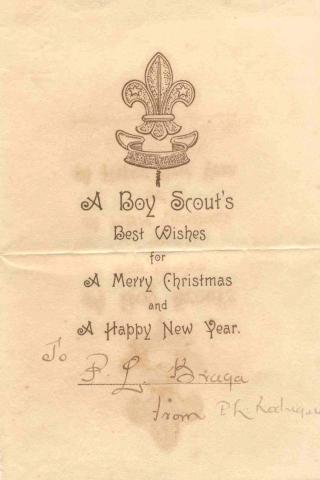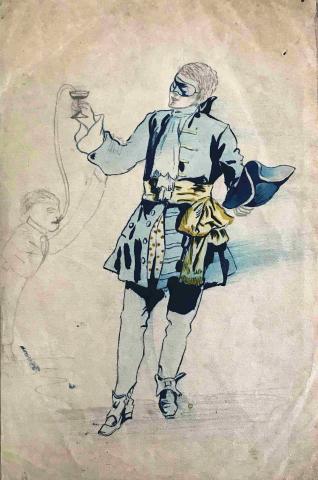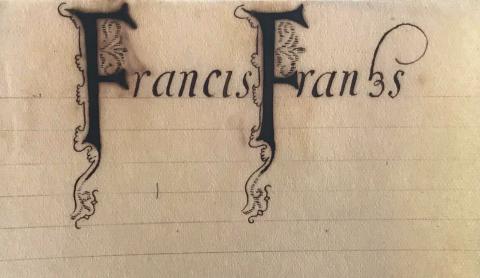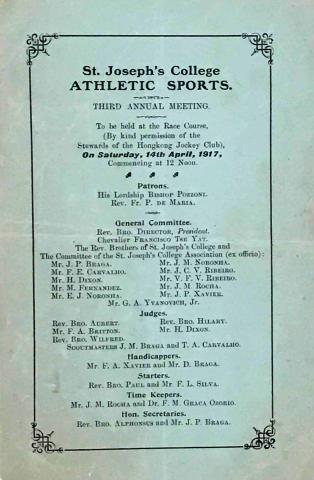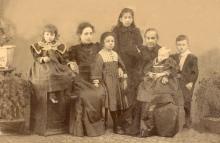Delfino Braga, named for his grandfather Delfino Noronha, was the fourth of thirteen children of José Pedro Braga and his wife Olive Pauline (née Pollard), and was educated at St Joseph’s College, Hong Kong. On leaving school, he was employed by the French bank, Crédit Foncier. What is known of his short life comes from an envelope of papers which appear to have been kept as precious relics by his mother when he died of septicaemia, at the threshold of promising manhood. They reveal a remarkable young man, with a maturity and self-confidence well in advance of his years. They also reveal a strong spiritual dimension that was warmly responsive to his mother’s patient and loving up-bringing.1
To Patrol Leader Braga from Patrol Leader Rodrigues
‘Chappie’ (his family’s name for him), or ‘Delf’ (as he signed himself) was clearly a leader in his family. Though he had two older sisters and an elder brother, Jack, nearly three years older than himself, he had seven younger brothers, all born in the next ten years. When Chappie was about fourteen, he got them to sign up as ‘partners’ in a recreational club in which each brother had to improve his fitness. He and Jack used to go rowing or swimming at 5.30 each morning to keep fit. He wrote well, was a good organiser and was meticulous in detail. His calligraphy was splendid, and he obviously took great pride in executing beautiful capital letters. He took himself very seriously, as high-minded teenagers tend to do, but he also had a great sense of fun.
He led the family in party games, describing one in a letter to his cousin Lena in Manila. It is easy to imagine the uproarious fun they enjoyed together.
We had a very nice party at home on Saturday in spite of the bad weather. We all had tea first of all upstairs and then we went down stairs for the games and songs. One of them was the old song of the Ten little nigger boys. We all stood in a row and as there were only 9 boys Maud took part also & Mother played the piano. Maud got shocked & went away leaving nine, so the others followed until we came to the last which was Hugh and he got married to Caroline.2
Chappie, a year younger than Maude, pulled his weight in the home, more than willing to do the dirty jobs. After he died, his mother wrote to her sister Crun,
I can see him now making a joke of emptying the chambers [chamber pots] and the buckets of sloppy slushy house refuse in the rain when we had no servants – I wanted to do it myself and would say I am afraid of his clothes, then he would pull up his trousers and put on my old skirt and blouse and make such a lot of fun and frolic, dancing up and downstairs and the children gleefully rushing after – the whole crowd.3
He was a keen sportsman and an enthusiastic Boy Scout. He was Patrol Leader of the 1st Hong Kong Troop of Boy Scouts, and willingly assumed responsibilities as secretary of the Football Club associated with it. He drew up rules for two sporting clubs: a Young Men’s Mutual Improvement Association and a United Club of Hong Kong – and typed out a lengthy speech to be delivered at the inaugural meeting of the latter. These rules emulate, possibly consciously, his father’s competence and experience in business affairs. In August 1916, he joined the Victoria Recreation Club. This was a largely Portuguese club, despite the British name. There is no record of his having linked up with the Club Recreio, the specifically Portuguese social and sporting club in which his father was a significant figure. He became passionately keen on stamp collecting, and during 1917 wrote to several stamp dealers in the U.S.A., in addition, presumably, to local contacts. He was extraordinarily well organised, and kept a detailed cashbook of his income and expenditure. The last entry was 10 cents spent on a rickshaw ride on 12 September 1917. A little more than a month later, he was dead.4
Perhaps the most significant indication of the values of this fine young man with so many interests and talents, is contained in an exchange of letters between Chappie and his aunt, Corunna Noronha (‘Auntie Crun’ to her nieces and nephews), in Manila, between 26 June and 24 September 1917, not long before he died.5 Corunna was, like her sister Olive in Hong Kong, a devout and earnest Christian. The warmth of affection and bond of understanding between aunt and nephew which the letters reveal is uncommonly strong. Corunna pressed her nephew: “Dear Chappy, Have you become a Christian and accepted Christ as your personal Saviour? Write and tell me, dear, for I pray for you and Jack every morning, also your Father.” He replied: “I always thought you knew that I was a Christian, though not a very good one. The Scout movement has helped me, and so have the lessons on Sunday given by Miss Meadows. I have been there several times with mother and received from her a page of the Grace Gospel Tidings which you have been good enough to send me. .. as Mother told me you said that ‘it pays to be a Christian’ and really it does.” He concludes, “Your Christian nephew, Delf”. Corunna replied on 24 September, only three weeks before her nephew died. “It is, dear, such a joy to think of you belong[ing] to Him. Let each of His children shine and walk worthy of His love, for it means much to be a Christian, but it is worth all to have the joy of knowing you are His, and should death call you away, you go home to Him ...” Chappie, like most of his brothers, had recently left the Roman Catholic Church, and had devoutly embraced his mother’s Protestant faith. Miss Meadows was a Bible teacher in the Gospel Hall, where they now worshipped.
J.M. Braga Papers, Additional Manuscripts, folder 72, National Library of Australia.
Chappie’s last illness and death are recorded in a harrowing letter written by his mother to her sister Crun. He was taken seriously ill with what may have been an abscess on the liver following a bout of dysentery on 7 October 1917, and the doctors in Hong Kong were unable to do anything for him. After some days of indecision and ineffectual treatment, his desperate mother took him to Macau, then a ferry trip lasting several hours; Portuguese doctors had a better reputation than local people, and many British doctors were away at the war. Olive was prepared to go to any length to save her son’s life. The trip only added to Chappie’s intense suffering in his last few days, but he held fast to his new-found faith, bravely refusing to accept the Catholic last rites, until his mother persuaded him for his father’s sake. When Chappie died in S. Rafael Hospital on 14 October at the end of a ghastly week, “Joe broke down like a little child in sorrow,” wrote Olive. She could not find words to express her own grief, but added, ‘Jean came with love to my rescue. She with such brightness and glowing love came like an angel’.
Chappie was buried in San Miguel Cemetery in Macau. In 1924, his brother Noel went there. ‘I visited Chappie’s grave, spending some minutes in quiet meditation around it. He is, I trust, asleep in Jesus’, he wrote in his diary.6
Forty years later, his brother Clem wrote to Jack on 14 October 1957. He always remembered that day, still mourning the loss of ‘fine Chappie’, who had not had the opportunity to go on to have his own family, ‘as others of us have done. Why must it be so?’ asked Clem plaintively. More than a century after Chappie’s death, this writer, a nephew, also feels the sadness of never having known a young man of such exceptional promise.
Stuart Braga
24 October 1996, revised, 3 April 2001, 7 August 2007, 18 April, 21 June 2008 and 19 November 2020. Illustrations added, 19 November 2020.
References:
- They were kept by Jean, in whose bank security box they were found on her death in 1987. A few other mementos were kept by his youngest brother Paul, who was only seven when Chappie died. Both groups are in the Stuart Braga Papers, State Library of New South Wales, Series 24.
- Delfino Braga to Lena Noronha, undated, but 1917. Pencilled draft, Paul Braga Papers, now in the Stuart Braga Papers, Series 24, State Library of New South Wales.
- Olive Braga to her sister, Corunna Noronha, October 1917. Typed copy in A.M. Braga Papers, now in the Stuart Braga Papers, State Library of New South Wales, Series 24.
- South China Morning Post, 16 October 1917.
- Transcripts made available by Sheila Potter, Chappie’s niece. The warmth of affection and bond of understanding between aunt and nephew which the letters reveal is uncommonly strong.
- Noel Braga Diary, 4 December 1924.

